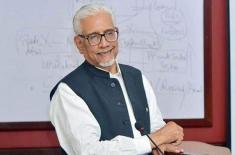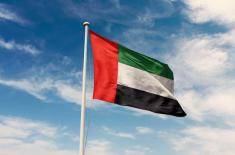
Warnings On Your Feed: How Social Media Could Help Pakistan Beat Climate Disasters
Umer Jamshaid Published September 20, 2025 | 02:40 PM

ISLAMABAD, (UrduPoint / Pakistan Point News - 20th Sep, 2025) When flood warnings flashed across her phone screen, 68-year-old Sakina from Sadi Town, Karachi, didn’t wait. She urged her family to evacuate, hours before devastating monsoon floods hit. While many neighbors lost their livestock, Sakina’s timely decision saved her family. Her story is a rare but powerful example of how early alerts, often spread through social media, can mean the difference between life and loss.
In an age where news travels faster than storms, social media is emerging as a vital tool in the fight against climate change, especially in disaster-prone countries like Pakistan.
With rising temperatures, more extreme floods, and unpredictable rainfall, Pakistan has faced worsening climate disasters. According to the UN’s Office for the Coordination of Humanitarian Affairs (OCHA), the 2025 monsoon season alone caused 739 deaths and destroyed over 2,400 homes, more than four times the damage seen in 2024.
Temperature extremes are another growing concern. The Pakistan Meteorological Department reports an average rise of 1.5°C over the past century. During the summer of 2025, some areas recorded blistering temperatures reaching 48°C. Vulnerable groups, especially the elderly, children, and the poor, are most at risk.
Despite this crisis, climate change is still not a priority for many. Public understanding remains low, and warnings often go unheard. But social media is changing that.
Platforms like Facebook, Twitter, Instagram, and TikTok are helping people understand climate issues through hashtags, infographics, short videos, and real-time alerts. Government agencies and crisis management authorities now use social media to warn citizens about approaching heatwaves, floods, and storms. A quick alert, even seconds before a disaster strikes, can save lives.
Dr. Muhammad Ismail Kumbhar, a sustainable development expert, talking to APP says that while the potential is there, Pakistan’s early warning system still has serious gaps. “Alerts are not localized or multilingual. Communities don’t know what actions to take. There’s poor coordination,” he says.
Dr. Kumbhar recommends no-build zones near rivers, flood-resilient housing, strict penalties for encroachment, and proper drainage systems. He also stresses using local tools—like mosque announcements, FM radio, and SMS, in disaster communication.
“We need clear disaster plans, community drills, and volunteer training,” he adds.
Environmental campaigns have gained massive attention online. Movements like Fridays for Future and Climate Strike have gone viral, educating young people across the world. In Pakistan, 68% of youth surveyed by UNICEF said social media is their top source of climate information, more than schools or universities.
Andleeb Khan, a journalist and social media influencer, talking to this scribe points out that while mobile alerts are already in use, many people ignore them, especially SMS messages. “On Facebook or TikTok, people are more likely to engage,” she says. “The key is making messages clear, localized, and accessible even to those without smartphones.”
But she also warns of “click activism”—where people share climate posts without taking action. Despite this, social media has fueled real-world results: tree plantation drives, cleanup campaigns, and flood relief donations.
Still, there’s a dark side. Misinformation spreads quickly, often due to outdated data or unverified sources. Experts stress the importance of using trusted voices and official pages to share credible content.
The truth is: awareness alone isn't enough. To prevent climate losses, Pakistan needs a strong early warning system, strict building laws in high-risk areas, and real safety planning at the community level.
When used wisely, social media can be more than a place for likes and shares. It can be a life-saving lifeline in a country where nature no longer knocks before entering.
Across the globe, social media has played a crucial role in averting disasters and saving lives. In the Philippines, during Typhoon Haiyan, Facebook and Twitter were used to coordinate rescue missions and reunite families. In Australia, emergency services used real-time Twitter updates to guide people away from bushfire zones. During Hurricane Harvey in the U.S., stranded residents used platforms like Twitter and Snapchat to call for help when emergency lines were jammed—prompting faster rescues. In India, WhatsApp alerts helped evacuate thousands ahead of the 2018 Kerala floods. These global examples show how digital platforms, when used effectively, can become life-saving tools in crisis situations.
Recent Stories

Ex-Federal minister Dr. Waqar Masood passes away

Govt eases RLNG connections for consumers with paid demand notices

Data of 300,000 Hajj applicants found on dark web

UAE marks International Day of Peace with leading role in crisis resolution, sta ..

UAE leaders congratulate President of Nepal on Constitution Day

Floodwaters wash away another section of M-5 motorway

FBR to take action against social media display of wealth

Pakistan team admits batting failures ahead of India clash

Trump sets $100,000 annual fee for H-1B worker visas

Mysterious changes near Earth’s core revealed by satellites

Over 1,800 flights disrupted at Dallas airports due to telecom

Currency Rate In Pakistan - Dollar, Euro, Pound, Riyal Rates On 20 September 202 ..
More Stories From Pakistan
-
Three drown in floodwater pit in Alipur
7 minutes ago -
Warnings on your feed: How social media could help Pakistan beat climate disasters
7 minutes ago -
Sialkot Airport celebrates everlasting Pak-Saudi ties
17 minutes ago -
Rs 150,000 fine imposed for overcharging
17 minutes ago -
Wheat ,flour availability reviewed in Gujrat
27 minutes ago -
Pak-Saudi defence pact seen as game-changer for regional security, deepening economic cooperation in ..
37 minutes ago
-
Revolutionary mobile HMIS mobile app launched at Ayub Medical Complex Abbottabad
57 minutes ago -

Data of 300,000 Hajj applicants found on dark web
1 hour ago -
ACS South donates 660 life jackets for doctors,paramedical staff serving at boat clinics in flood-af ..
1 hour ago -
CM Gilgit-Baltistan expressed condolences with bereaved family of Baba Chilasi on his passing
1 hour ago -
5 suspects of Afghan ‘9T6 group’ held as ICT Police recover illegal arms
1 hour ago -
President, PM grieved over Dr Masood’s death
1 hour ago
